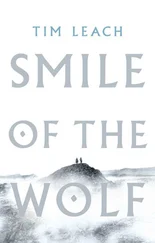If only they had captured the horses – that would have made for a worthy prize. For this was a pitiful people, scratching out their living on the borders of the Empire. But the Emperor had never seen horses like the ones these barbarians rode. Impossible to catch them, it seemed, for they fought like monsters even after their masters were slain, all the way to the last.
Still, it was not all a loss. They had won something on the battlefield that was worthy of celebration. Some particular prizes of flesh. He knew his people well enough, that they would keep until last the finest treasure.
For here, at last, was iron, the deep hard grey of the manacles. And there, too, was gold, for many of the prisoners were golden haired, those wild-eyed children of the steppe.
They held themselves with pride, even as they swayed and stumbled on their feet – wounded and half-starved, unused to walking on their bowed horsemen’s legs. There were some who carried others, entire ranks of prisoners who all leaned against one another to stay upright. The Emperor’s eyes danced across their ranks, noting the greyhaired men, the frightened boys amongst them. And women too – he had thought them myths, when first he had been told of them.
At the sight, hoots and jeers from the ranks, quickly silenced by the centurions. Other emperors had favoured the leering soldier – the first Caesar, himself a famous lecher, had made a sport of such a thing. But the men knew that this Emperor was not such a man.
As if in answer, words rose from the ranks of the slaves – not curses or empty boasts, but some sweet, sad song of death. The guardsmen raised their cudgels, looking to centurion and Emperor for the sign to beat the music out of them. No signal was given, and they let the song wind around to silence.
The Emperor spoke.
‘Some of you have fought at our side before. Years before. And I am certain that amongst you, there are those that learned our language. For it was a long campaign we fought together. You have forgotten that fellowship, it seems. That is a shame. But I think some will still know the words. Speak, then, and live.’
Silence answered him. It did not matter.
He strolled beside the ranks – a safe distance, for he could see the twitching hands, the manacles that were wrapped into clubs and garrottes, the killing hunger those men and women had in their eyes.
The Emperor looked for the older men, those old enough to have fought in the last war. The ones who had the look of command, the light of intellect, who might have once been quick with laugh and song. He beckoned those men forward. Shoved and pulling, they came.
He spoke to each in turn. Stories of his son, Commodus, of the miracle of the rain that had defeated the Quadi, the wars that had finally broken the Marcomanni. Each man he spoke to stared back, blankly defiant, no sign of understanding his words. But at last, he found what he sought.
A rough-faced barbarian – a tall man, his hair touched with grey, deep-carved lines of laughter spreading from the corners of his eyes like cracks from ice. The Emperor spoke of his son to this man, and a bare flicker passed across his face.
‘You speak our tongue, don’t you?’ the Emperor said.
No response to this.
‘I ask you no betrayal of your people. But you shall speak with me.’ The Emperor raised his hand, and one by one he pointed to the boys who stood and trembled in the ranks of the prisoners. ‘Or I shall crucify them. You understand this word, crucify?’ The barbarian made no answer, but he did not need to. The Emperor could see written upon his face that he understood well enough.
For there had been more than the sign of language on that face – there was also something of the father about him. Most of those people seemed blood-mad enough to forget all bonds, but there were those, it seemed, who yet possessed the weakness of love.
‘You shall speak with me?’
The barbarian raised his head, and nodded in defeat.
‘Good. We shall talk of many things. But first – tell me this. Tell me your name.’
It was no travelling camp that Kai and his companions made that night, but one of war.
In the days before, when they had thought the danger a little way behind, Kai had let something of the nomad’s slackness drift into their night camps. What koumiss they had passed freely, the fires burned openly, and when a mounted sentry followed a path that struck his fancy or sounded out a song to keep him company on the watch, no reprimand was offered. And the talk about the fire had been of the past and future, not the bloody matter of the present, the work of sword and spear.
Now, with the smoking ruins of Iolas a day’s ride behind them, the sentries moved in silent circles, and the others gathered close around the fire with their cloaks spread wide to hide the sight of the flame. The smoke they could do little about but hope it might not be seen in the night sky, that it would be mistaken for a twisting band of cloud or mist.
The talk around that fire was not wistful tales of the dead, nor the drifting talk of travellers gathered under open skies. The talk was of killing, of one grip of the lance compared to another, and the endless decisions of how the warband should be ordered. Which riders paired well with each other, where each man and woman should be placed in the formation, and, perhaps most important of all, the politics of their horses. For those horses had their own silent friendships, the bloodfeuds that could only be settled in death. Battles had turned in a moment when one horse could not abide the company of another and the line of the charge fell to pieces.
It was to that war fire that a figure came in from the dark. Kai took it for a sentry coming to be relieved, but he soon saw that it was a man from one of the outer fires, where the unproven and the unlucky were made to sleep. Gaevani, those sharp eyes of his glittering in the firelight, one arm restlessly kneading the other that had been wounded in the duel. The wound itself had mostly healed, Kai thought, but still the man picked at it, the ghost of an injury.
A few of the men shuffled reluctantly aside, but Gaevani made no move to sit. ‘Oh, don’t trouble yourselves,’ he said. ‘I don’t come to share the fire. I come to speak with the captain.’
‘Speak then.’
‘Alone.’
Tamura stood on the far side of the fire. ‘You have no need to speak with him,’ she said. ‘You take your place, and keep your mouth shut.’
‘Oh, the foal grows fast, I see,’ Gaevani answered. ‘I’d let him decide that. He has reason to let me speak, don’t you, captain? Or keep me quiet.’
A sharp moment of silence, the warband waiting, alive as any pack of strays to the slow ebb of authority, the sudden bite of mutiny.
Kai shrugged. ‘Any of you may speak with me, while the moon is young and the fire strong.’ He paused, and grinned. ‘And while there’s no man or woman in my blankets to keep me company.’
Laughter then, and while the sound danced in the air he stood and gestured for Gaevani to join him. Another shadow rose from the fire – Laimei, falling into step with them, and neither Kai nor Gaevani spoke a word to make her stay behind. They both knew that there was no denying her will, whether Kai were captain or not.
A difficult thing, to find privacy in the war camp. Always the sentries circling, and they could not go too far beyond the fire. And so they went to where the horses were tethered, keeping their own silent counsel. For Kai remembered an old proverb his father had once told him, that only a horse might be trusted with a secret.
Читать дальше
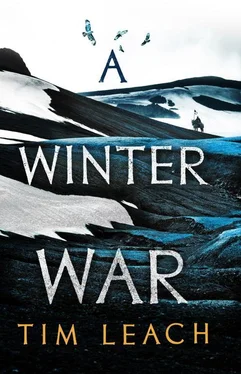
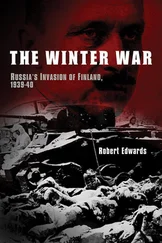

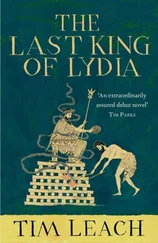
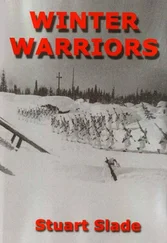
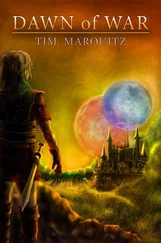

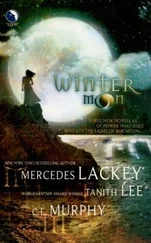
![Стюарт Слейд - Воины зимы [Winter Warriors ru]](/books/401383/styuart-slejd-voiny-zimy-winter-warriors-ru-thumb.webp)
